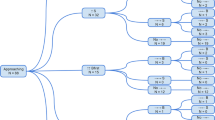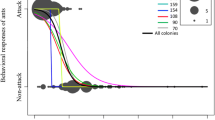Summary
-
1.
Interspecific aggression is viewed as a device of behavioral interference employed in resource competition with individuals of other species. Aggression-mediated competition is costly in terms of time and energy invested as well as increased risk of injury or predation. Consequently, natural selection should favor recognition of competitors and differential aggression depending upon the degree of competitive overlap.
-
2.
Mockingbirds (Mimus polyglottos) inhabiting a residential area in the piedmont region of South Carolina (USA) maintain winter feeding territories within which they defend fruit-laden trees and shrubs. Several of the many species occurring with the mockingbird in the study area are frugivorous and represent to varying degrees resource competitors, thus offering an opportunity to study interspecific aggression.
-
3.
Field observations of mockingbird interactions with members of other species reveal that frugivores provoke mockingbird aggression while non-frugivores are essentially ignored. Moreover, the aggressiveness is directly proportional to the extent of frugivory among competitors.
Similar content being viewed by others
References
Beal, F.E.L.: Food habits of the robins and bluebirds of the United States. U.S. Dept. Agr. Bull. 171, 1–31 (1915)
Bent, A.C.: Life histories of North American thrushes, kinglets, and their allies. New York: Dover 1964a
Bent, A.C.: Life histories of North American nuthatches, wrens, thrashers, and their allies. New York: Dover 1964b
Bent, A.C.: Life histories of North American wagtails, shrikes, vireos, and their allies. New York: Dover 1965a
Bent, A.C.: Life histories of North American blackbirds, orioles, tanagers, and their allies. New York: Dover 1965b
Bent, A.C.: Life histories of North American cardinals, grosbeaks, buntings, towhees, finches, sparrows and their allies. New York: Dover 1968
Bock, C.E.: The ecology and behavior of the Lewis woodpecker (Asyndesmus lewis). Univ. Calif. Publ. Zool. 92, 1–100 (1970)
Brown, J.L.: The evolution of diversity in avian territorial systems. Wilson Bull. 76, 160–169 (1964)
Ebersole, J.P.: The adaptive significance of interspecific territoriality in the reef fish Eupocentrus leucostictus. Ecology 58, 914–920 (1977)
Gill, F.B., Wolf, L.L.: Economics of feeding territoriality in the golden-winged sunbird. Ecology 56, 333–345 (1975)
Low, R.M.: Interspecific territoriality in a pomacentrid reef fish, Pomacentrus flavicauda whitney. Ecology 52, 648–654 (1971)
MacRoberts, M.H., MacRoberts, B.R.: Social organization and behavior of the Acorn Woodpecker in central coastal California. Ornithol. Monogr. 21, 1–115 (1976)
Michener, H., Michener, J.R.: Mockingbirds, their territories, and individualities. Condor 37, 97–140 (1935)
Miller, R.S.: Pattern and process in competition. Advanc. Ecol. Res. 4, 1–74 (1967)
Moore, F.R.: Flocking behavior and territorial competitors. Anim. Behav. (in press) (1977)
Myrberg, A.A., Jr., Thresher, R.E.: Interspecific aggression and its relevance to the concept of territoriality in reef fishes. Amer. Zool. 14, 81–96 (1974)
Stamps, J.A.: The relationship between resource competition, risk, and aggression in a tropical territorial lizard. Ecology 58, 349–358 (1977)
Author information
Authors and Affiliations
Rights and permissions
About this article
Cite this article
Moore, F.R. Interspecific aggression: Toward whom should a mockingbird be aggressive?. Behav Ecol Sociobiol 3, 173–176 (1978). https://doi.org/10.1007/BF00294988
Received:
Issue Date:
DOI: https://doi.org/10.1007/BF00294988




